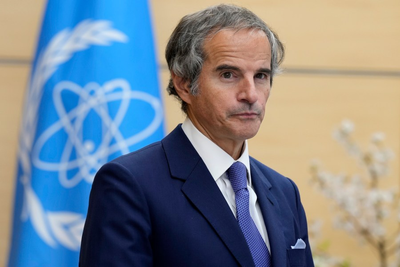
The Details
In a development that has sent shockwaves through the international community, Iran has begun enriching uranium with thousands of advanced centrifuges at its underground Fordo facility. This significant leap forward in Iran's nuclear program comes as the country continues to push the boundaries of its civilian space program.
The Centrifuge Advantage
According to a statement issued by the International Atomic Energy Agency (IAEA), Iran has started feeding two cascades of advanced IR-6 centrifuges with uranium previously enriched up to 20% at Fordo. The IAEA warned in late November that Iran was preparing to begin enriching uranium with thousands of advanced centrifuges, and this development appears to be a direct response.
Nuclear Enrichment Speed
The IR-6 centrifuges are capable of enriching uranium faster than Iran's baseline IR-1 centrifuges, which have been the workhorse of the country's atomic program. Adding 20% uranium, as opposed to 5% uranium previously planned, further speeds up the enrichment process.
Centrifuge Specifications
The IAEA statement also noted that Iran will start feeding natural uranium into eight other IR-6 cascades at Fordo to produce 5%-enriched uranium. The specifications of these advanced centrifuges are a significant concern for the international community, as they have the potential to increase the rate of production.
Space Program Connection
Meanwhile, Iran has successfully launched a Simorgh rocket carrying an "orbital propulsion system," as well as two research systems and the Fakhr-1 satellite for the country's military. The payload of the Simorghiniwas significantly heavier than all its previous successful launches within the country, weighing 300 kilograms (660 pounds).
International Reactions
The United States has previously said that Iran's satellite launches defy a U.N. Security Council resolution and called on Tehran to undertake no activity involving ballistic missiles capable of delivering nuclear weapons.
Nuclear Implications
This development has significant implications for the international community, as it appears to further erode the constraints on Iran's nuclear program. The United States and its allies have long been concerned about Iran's intentions, and this move will likely heighten tensions between Tehran and Washington.
Context of Nuclear Program
Iran's relatively moderate former President Hassan Rouhani slowed down the country's space program during his tenure due to fear of raising tensions with the West. However, the late hard-line President Ebrahim Raisi pushed the program forward, and the current reformist President Masoud Pezeshkian has yet to offer a strategy when it comes to Iran's ambitions in space.
Conclusion
A failure to address these concerns could have far-reaching consequences for regional and global security. It is essential for the international community to come together to ensure that regional and global security are maintained, and tensions between Tehran and Washington continue to escalate.
Keywords Used:
- Nuclear Program
- Civilian Space Program
- IR-6 Centrifuges